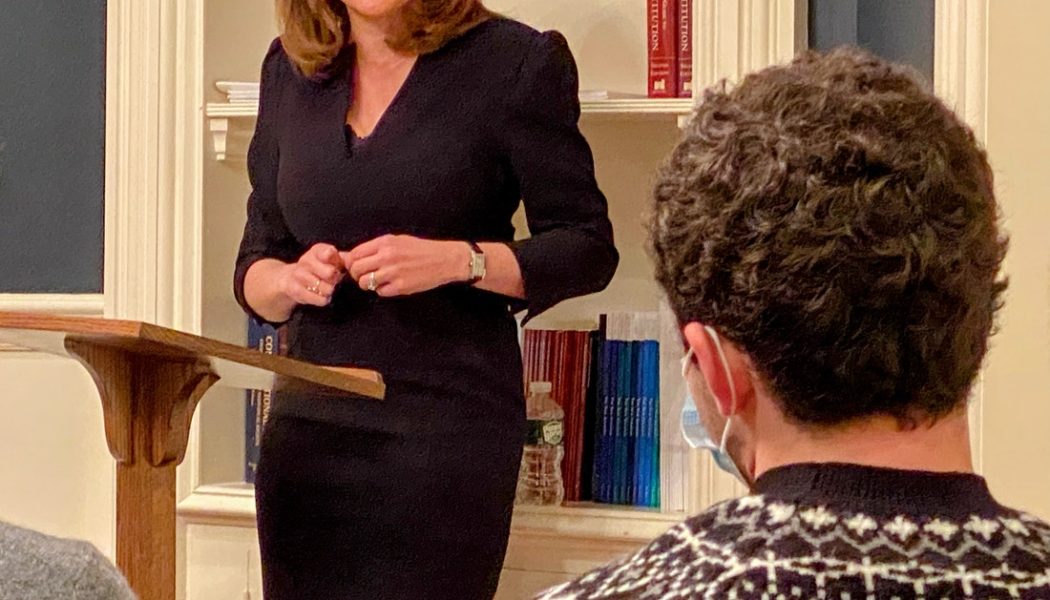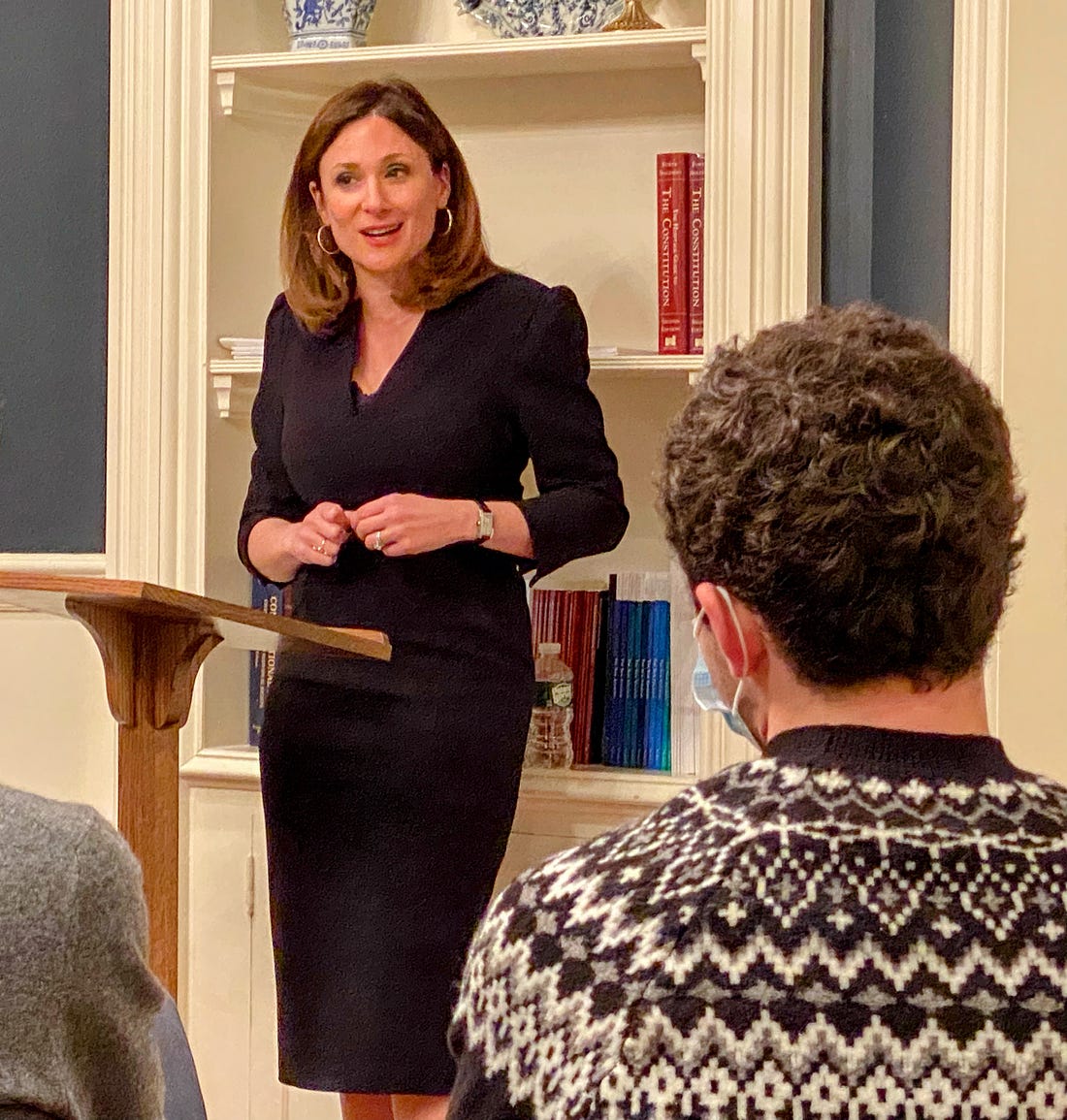I was so honored tonight to be hosted by the Princeton Tory, the Witherspoon Institute and the Tikvah Fund. The undergraduates I met tonight were clear sighted and brilliant and astonishingly well read. There’s so much on their shoulders. Here was my message to them.
The question I get most often—the thing that most interviewers want to know, even when they’re pretending to care about more high-minded things—is: What’s it like to be so hated? I can only assume that’s what some of you rubberneckers want to know as well: What’s it like to be on a GLAAD black list? What’s it like to have top ACLU lawyers come out in favor of banning your book? What’s it like to have prestigious institutions disavow you as an alum? What’s it like to lose the favor of the fancy people who once claimed you as their own?
So, perhaps I’ll begin by telling you a little bit about myself mainly because I’m not so different from many of you. I grew up, daughter of two Maryland State judges, in a multi-racial suburb in Prince George’s County, Maryland. I attended a community Jewish day school, which I loved. In high school, I worked as a stringer for the Washington Jewish Week and edited my school paper. I attended Columbia University, where I received the Kellett Fellowship for two years of graduate study at Oxford. From there, I earned my J.D. from Yale Law School and then clerked for a Clinton-appointee on the D.C. Circuit.
At the beginning of my clerkship, I accepted a setup with a guy from Los Angeles, and by the end of that year, had decided to follow my then-boyfriend to California. I took a job with a terribly prestigious LA firm, whose daily tasks nearly anesthetized me. I married my boyfriend, struggled to hold onto pregnancies, quit law firm life and had three children. I taught them to read and sang them songs very badly and wrote a series of unpublishable novels. Most people who’d known me before wondered what the hell I was doing.
I began writing a few op-eds for our local Jewish paper, one of which was spotted by a Wall Street Journal editor, who invited me to submit to the Wall Street Journal. I did, and in the course of that year, published 13 op-eds with the Journal. One of those op-eds inspired a reader to contact me and tell me the story of her teen daughter who was rushing into a sudden gender transition. After trying and failing to find an investigative journalist who wanted the assignment, I took it on myself. My investigations turned into a book called Irreversible Damage.
All of which is to say: I’m not a provocateur. I don’t get a rush from making people angry. You don’t have to be a troll to find yourself in the center of controversy. You need only be two things: effective, and unwilling to back down.
Why am I unwilling to back down? Why wouldn’t I prostrate myself before the petulant mobs who insist that my standard journalistic investigation into a medical mystery—specifically, why so many teen girls were suddenly identifying as transgender and clamoring to alter their bodies—makes me a hater? Why on earth would I have chosen to write this book in the first place and am I glad that I wrote it?
You don’t have to be a troll to find yourself in the center of controversy. You need only be two things: effective and unwilling to back down.
If you’re here, you no doubt are familiar with at least some of the unpleasantness you encounter whenever you deviate from the approved script. So, again, what’s it like to be the target of so much hate? It’s freeing. That’s what I’d like to talk about tonight.
As an undergraduate studying philosophy, I spent an inordinate amount of time wondering whether my will was free. This is the metaphysical question of whether anyone can be said to have acted ‘freely.’ And most of the philosophers seemed to agree that our will wasn’t all that free. The hard determinists painted a world in which every human action was ultimately explicable by the wave function of elementary particles, ultimately leading neurons to fire—setting off of axonal conduction well beyond our control and none of which we directed.
Even if you weren’t a hard determinist, you struggled with the obvious problem that human decisions – and the reasons behind them – are structured by one’s upbringing, experience or even inborn personality traits, all of which shape our motivations. Compatibilists claimed that, at most, one could hope to live according to one’s own motives and preferences. That is, motives and preferences that were largely determined by things like personality.
“The Actions of man are never free,” 18th Century determinist Baron Holbach once wrote. “They are always the necessary consequence of his temperament, of the received ideas, and of the notions, either true or false, which he has formed to himself of happiness, of his opinions, strengthened by example, by education, and by daily experience.”
I remember reading those lines as an undergraduate, tugged by the worry that Holbach was right: maybe our motivations were determined by our personalities and upbringing and received ideas. Today, I read them and think: if only.
In 2021, it seems a luxury to worry that a will determined and shaped entirely by received ideas and our own personality-driven desires might not be entirely free. Today, before any of us decides what it is we want, we open our phones and participate in our own manipulation at the hands of those who actively want us to think, and see, and vote differently than our own wills would have us do. If we were not entirely free before, in other words—we are far less so now.
Every dating app pushes us toward the same few attractive mate choices; Spotify presses us to like the same music; Amazon pushes us to purchase specific books and away from others. If you’re under the impression that the books Amazon recommends to you are based solely on a content-neutral algorithm, I can disabuse you of that fiction right now. I once asked one of my sources at Amazon, who was concerned about the ways the search results were being manipulated, whether he’d ever seen a book deliberately boosted. Yes, he said. Becoming by Michelle Obama. When that book came out – he told me – virtually every search you did led to the recommendation to buy the former First Lady’s book. And the opposite is also true. There are books that are never recommended by the Amazon algorithm, irrespective of how well they’ve sold or how likely a specific shopper is to buy them. Or, at least, there’s one such book. I’ll let you try and guess what it is.
But the larger point is, your will is being toyed with, subverted, manipulated. And in a fairly insidious manner. None of you will be shocked to hear that Google promotes certain search results in order to lead us to a certain perspective. But did you know that, for contested entries, Wikipedia assigns editors, some of whom are ideologically committed activists, many of whom have very particular views they want you to walk away with.
If you form views based on those Wikipedia articles or reports by corrupt fact-checkers, if you act based on them, are you exercising freedom of will? Given that you’ve been spun and prodded along to a pre-determined conclusion by hidden persuaders, perhaps you aren’t. Perhaps you’re left in the same sorry state as the Moor of Venice: toyed with, subverted, manipulated. Acting out someone else’s plan, pointed in the direction that he wants you to walk.
We’ve spent a lot of time in the past few years debating whether this kind of manipulation is at the root of our political divisions, but I don’t think we’ve paid enough attention to an even more basic question: how it has interfered with freedom of conscience and ultimately free will.
When polled, nearly two out of three Americans (62%) say they are afraid to express an unpopular opinion. That doesn’t sound like a free people in a free country. We are, each day, force-fed falsehoods we are all expected to take seriously, on pain of forfeiting esteem and professional opportunity:
“Some men have periods and get pregnant.” “Hard work and objectivity are hallmarks of whiteness.” “Only a child knows her own true gender.” “Transwomen don’t have an unfair advantage when playing girls’ sports.”
On that final example of a lie, the one about transwomen in girls’ sports, I want you to think for a moment about a young woman here at Princeton. She’s a magnificent athlete named Ellie Marquardt, an all-American swimmer who set an Ivy League record in the 500-meter freestyle event as a freshman. Just before Thanksgiving, Ellie was defeated in the 500-meter, the event she held the record in, by almost 14 seconds by a 22 year old biological male at Penn who was competing on the men’s team as recently as November of 2019. That male athlete now holds multiple U.S. records in women’s swimming, erasing the hard work of so many of our best female athletes, and making a mockery of the rights women fought for generations to achieve.
Ellie Marquart swam her heart out for Princeton. When will Princeton fight for her? Where are the student protests to say—enough is enough. When a biological male who has enjoyed the full benefits of male puberty—larger cardiovascular system, 40% more upper body muscle mass, more fast-twitch muscle fiber, more oxygenated blood—decides after three seasons on the men’s team to compete as a woman and smashes the records of the top female swimmers in this country, that is not valor—that’s vandalism.
Where is the outrage? Imagine, for a second, what it must be like to be a female swimmer at Princeton, knowing you must pretend that this is fair—that the NCAA competition is anything other than a joke. Imagine being told to bite your tongue as men lecture you that you just need to swim harder. “Be grateful for your silver medals, ladies, and maybe work harder next time,” is the message. Imagine what that level of repression does to warp the soul.
Now, imagine, instead, the women’s swimmers had all walked out. Imagine they had stood together and said: We will meet any competitor head on. But we will not grant this travesty the honor of our participation. We did not spend our childhoods setting our alarm clocks for 4am every morning, training for hours before and after school, to lend our good names to this fixed fight.
“Be grateful for your silver medals, ladies, and maybe work harder next time,” is the message. Imagine what that level of repression does to warp the soul.
I know why students keep their heads down. They are hoping for that Goldman or New York Times internship, which they don’t want to put in jeopardy. Well, any institution that takes our brightest, most capable young people—Princeton graduates!—and tells you can only work here if you think like we tell you to and keep your mouth shut, that isn’t really Goldman Sachs and it isn’t the paper of record. It’s the husk of a once-great institution, and it’s not worth grasping for. Talk to alums at these institutions: they sound like those living under communist regimes. That’s the America that awaits you if you will not speak up.
You who are studying at one of the greatest academic institutions in the country only to be told that after graduation, you must think as we tell you and recite from this script—why were you born? What’s the point of being alive? Computers are vastly better at number crunching. They’ll soon be better at all kinds of more complex tasks. What they cannot do is stand on principle. What a computer cannot do is refuse to lend credibility to a rigged competition—to refuse to strengthen its coercion—making it that much harder for the next female athlete to speak up. What the computer cannot know is the glorious exertion of the human will when it refuses to truckle in the face of lies and instead publicly speaks the truth.
Machines will soon be better than humans at all kinds of complex tasks. What they cannot do is stand on principle.
I didn’t write Irreversible Damage to be provocative. In a freer world, nothing in my book would have created controversy. I wrote the book because I knew it was truthful and I believed recording what I found—that there was a social contagion leading many teenage girls to irreversible damage—was the right thing to do. I also believe if I hadn’t written it, thousands more girls would be caught up in an identity movement that was not organic to them but would nonetheless lead them to profound self-harm. But I didn’t write it specifically to stop them. I wrote it simply because it was true.
When I testified in front of the Senate Judiciary Committee back in March, I started by stating that I am proud to live in an America where gay and transgender Americans live with less stigma and fear than at any point in American history. That is the glory of freedom as well—the chance for adults to live authentic lives and guide their own destinies. And allowing mature adults to make those sorts of choices for themselves is absolutely a requirement of a free society. Yes, you can reject the false, dogmatic insistences of Gender Ideology and still wish to see transgender Americans prosper and flourish and fulfill their dreams in America. I do.
I wrote the book because the story of one mom and her teen daughter compelled me, and so did that of the dozens of other parents who then spoke to me—mothers and fathers who sobbed as they described how their daughters had become caught up in a craze that seemed completely inauthentic to the child, but which they were powerless to arrest.
I wrote the book not because I believed the fancy institutions I’d attended would celebrate me, or even acknowledge me, after I had done so. I wrote it because I knew that the point of all the educational opportunities I received that my equally-qualified grandmothers never had, the purpose of all the sacrifices my parents had made for my education—for all the time my teachers and professors had taken with me—couldn’t be to plod through life on a forced march. The point of all the hours my parents and teachers and mentors had devoted to me, was surely not to become the world’s best-oiled automaton. The point of all of that privilege—and yes, I think that was a kind of privilege—was to be able to write and think as others lacked the will to do.
Spotify employees tried to hold that company hostage because they carried my podcast episode with Joe Rogan. Amazon employees threatened to quit if they continued to carry my book. GoFundMe shut down a grass-roots fundraiser by parents, who reached into their own pockets, to advertise my book. And the ACLU threw its entire, century-old mission in the garbage, all because of one book with which it disagreed. Joining these petulant mobs is not a show of strength, and it is not freedom. It’s closer to servitude.
I wrote Irreversible Damage because I knew the point of all the educational opportunities I received—opportunities my equally-qualified grandmothers never had—couldn’t be to plod through life as a well-oiled automaton.
True, if you dare exercise your will, you may sit for decades on the Supreme Court, as the eldest member, the only African American, perform your duties admirably and with integrity, and perhaps not a single elementary school in America will bear your name. Does anyone doubt this is a discredit to his detractors—not to Justice Thomas?
I cannot claim to know if we are truly free in the metaphysical sense. But if the universe is anything less than thoroughly determined down to the last sub-atomic particle, then we must also agree that freedom admits of degrees. And if that is true, then we are far less free today in this decade—that you, as undergrads, have lost a significant measure of freedom that your parents once had. Take it back. Take it back. It’s yours to demand. Take back the right to speak your mind—thoughtfully, courteously, with a goal in mind beyond giving offense. The list of unmentionable truths expands so rapidly, without reason other than the attempt to suffocate a free people so that they forget the exhilaration of a lungful of air.
If you are someone who believes you have pronouns or would like to supply them, by all means, that is your prerogative. Whenever anyone asks me to use their preferred pronouns, and I can do so without confusing my audience or muddying an argument, I do so and I think this is an important courtesy. But –when asked, I will not state my pronouns and if you don’t believe in Gender Ideology, you shouldn’t either. When you state your pronouns, you participate in the catechism of Gender Ideology – the belief that there are ineffable genders, unknowable to all but the subject. That no one can possibly know I am a woman unless I’ve supplied these. I do not believe this. I regard this as nonsense. When asked for my pronouns, I say: “I am a woman.” Take back your freedom. Reclaim it now.
Psychiatrists and pediatricians tell me they are afraid to resist an adolescent’s demand that she be given puberty blockers because they’re afraid—if they point out the risks or the hastiness of the decision—they will lose their licenses. Parents tell me they are afraid to push back on the activist teachers and social workers at their kids’ school for fear of being called some flavor of phobe. Whatever freedom is—it isn’t that—and all of the wonderful education you have earned here will have been wasted if you find yourself one day observing some lie predominating in your own field and the best you can do is sit on the phone with me anonymously lamenting the state of things. You will soon be graduates of Princeton. Show some self-respect and reclaim your freedom.
It isn’t in those moments when you do just what’s expected that your will is tested. It isn’t in those moments when you recite the script that you exceed what any computer can achieve. Those moments when you managed to make yourself a faceless member of a pre-approved chorus will slide away as though you were never part of them.
The wonderful education you have earned here will have been wasted if you find yourself one day observing some lie predominating in your own field, and the best you can do is sit on the phone with me anonymously lamenting the state of things.
You will, each of you, have the chance to matter. You will find yourselves at hospitals or in banks or in courtrooms and at newspapers where you will see things happen that you know to be wrong—where you find that the standard line is actually a lie. You may have found yourself there already. If you’re fortunate enough, you may even find yourself one day with children of your own, knowing you are their best defense in this world. And you’ll feel the nub of your will, pressing you to do something—say something. And when that happens, don’t sit there like a sock puppet.
I’m 43, which I realize makes me very old to many of you. But not so long from now, you’ll wake up and be 43 yourselves. And when I look back on my life thus far, it occurs to me that the decisions of which I am most proud—the ones that strike like an unexpected kiss—are not the times when I obeyed the algorithm. They’re the times when I defied it and felt, for a moment, the magic and power of being alive. When I felt, even for an instant, the exquisite joy of not being anyone’s subject. When I had the unmistakable sense that I’ve existed for a purpose, that I stood the chance of leaving the world better than I found it. You don’t get any of that through lock-step career achievement and you certainly don’t get that by being the Left’s star pupil.
You feel that frisson when you choose a person to commit yourself to knowing full well that any marriage may fail; when you bring children into a world where there are no guarantees of their safety or success. When you summon the courage to fashion a life, something that will remain after you are gone. When you speak the truth publicly—with care and lucidity. And when you say to the world: you cannot buy me with flattery. Purchase my colleagues or classmates at bulk rate. I am not for sale.
Thank you.
Join Our Telegram Group : Salvation & Prosperity









